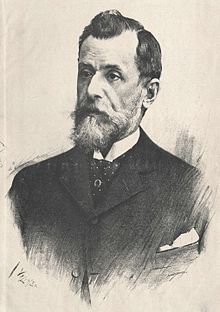Ernst von Plener
Ernst von Plener (born October 18, 1841 in Eger , Bohemia , † April 29, 1923 in Vienna ) was a leading politician from the German-liberal camp in Old Austria , finance minister and president of the court of audit.
Life
As the son of Ignaz von Pleners (1810-1908), which 1860-1865 as Imperial Finance and 1867-1870 in the so-called " citizen's ministry " as kk Trade Minister Cisleithaniens in the transition from Absolutism had proved a constitutional monarchy, grew Ernst von Plener without difficulty into a role as a leading figure in the liberal camp. First he took on diplomatic tasks in Paris and then in London in 1867, where he developed his respect for the British constitution.
In 1873 he took over the seat of the Eger Chamber of Commerce from his father in the House of Representatives of the Reichsrat , which was then elected according to curiae, and assumed the chairmanship of the German Liberal (constitutional) party. In 1878 he advocated the occupation of the Ottoman provinces of Bosnia and Herzegovina granted to Austria-Hungary at the Berlin Congress , which led to the split in the party.
In the increasing ethnic disputes within the Danube Monarchy since the middle of the 19th century , he resolutely represented the German citizens of the western half of the empire (who were also called " German Austrians " in the later phase to distinguish them from the "Reich Germans ").
In order to reduce the national tensions in Bohemia, Plener advocated an administrative division of the crown land. He was instrumental in the fact that in the 1890s there was a division of the regional school council, the regional culture council and the establishment of a German senate at the higher regional court in Prague. Further efforts by Plener failed, however, because of the resistance of the Czech parties, who feared a complete disruption of Bohemia.
Ernst von Plener achieved his highest position from 1893 to 1895 as the Imperial and Royal Finance Minister. He continued the reform projects initiated by his predecessor Emil Steinbach , such as currency reform and personal income tax. After the emperor's removal from the government in 1895, Plener decided not to become active again as a parliamentarian. From 1895 to 1918 he was President of the joint Supreme Audit Office, which audited the three joint ( kuk ) ministries that were responsible for the whole of Austria-Hungary.
In 1900 he was appointed by the emperor to the manor house of the Imperial Council. There he once again took a resolute stand against universal, equal suffrage for men because he feared the non-German majority of the population would have too much influence. In 1907, shortly before his death (1908), the emperor raised his father to the status of hereditary baron; the son was thus entitled to take on this title of nobility (which was generally abolished in spring 1919).
Plener's political base, the German liberal camp, a party of dignitaries , turned out to be too narrow in view of the intensification of nationality conflicts, the expansion of the right to vote for men, which was carried out in several stages, and the emergence of the modern mass parties of Christian Social and Social Democracy . The possibility of the German liberals to attract representatives of assimilated Judaism was reduced as a result of increasing anti-Semitism . Ernst von Plener and his political friends such as Ernest von Koerber , Imperial and Royal Prime Minister 1900–1904 and joint Minister of Finance 1915–16, and Josef Redlich , the last Imperial and Royal Finance Minister in 1918, were highly respected men by the Kaiser and experts, but ultimately only as experts could not succeed as party politicians with a power base.
Ernst von Plener left memories in three volumes (Vienna 1911–21). He found his final resting place in the family crypt in the Hietzingen cemetery .
Honors
- Dr. phil. (hc) Breslau
- 1st class of the Order of the Iron Crown (1895)
- Grand Cross of the Leopold Order (1911)
- Order of the Red Eagle 1st class
- Legion of Honor
Individual evidence
- ^ Lorenz: Koerber Ernest von. In: Austrian Biographical Lexicon 1815–1950 (ÖBL). Volume 4, Publishing House of the Austrian Academy of Sciences, Vienna 1969, p. 44 f. (Direct links on p. 44 , p. 45 ).
literature
- W. Goldinger: Plener Ernest Frh. Von. In: Austrian Biographical Lexicon 1815–1950 (ÖBL). Volume 8, Verlag der Österreichischen Akademie der Wissenschaften, Vienna 1983, ISBN 3-7001-0187-2 , p. 122 f. (Direct links on p. 122 , p. 123 ).
- Helmut Rumpler : Plener, Ernst Freiherr von. In: New German Biography (NDB). Volume 20, Duncker & Humblot, Berlin 2001, ISBN 3-428-00201-6 , p. 529 f. ( Digitized version ).
- Brigitte Klein: Ernst von Plener - his way to becoming a politician. Vienna 1980.
- Wolfgang Fritz : Ernst von Plener: A hope that never came true. In: Wolfgang Fritz: For Emperor and Republic. Austria's finance minister since 1848. Vienna 2003.
Web links
- Literature by and about Ernst von Plener in the catalog of the German National Library
- Newspaper article about Ernst von Plener in the 20th century press kit of the ZBW - Leibniz Information Center for Economics .
- Entry on Ernst von Plener in the Austria Forum (in the AEIOU Austria Lexicon )
- Ernst von Plener in the Vienna History Wiki of the City of Vienna
| personal data | |
|---|---|
| SURNAME | Plener, Ernst von |
| BRIEF DESCRIPTION | Bohemian politician, Minister of the Danube Monarchy and President of the Court of Auditors |
| DATE OF BIRTH | October 18, 1841 |
| PLACE OF BIRTH | Eger , Bohemia |
| DATE OF DEATH | April 29, 1923 |
| Place of death | Vienna |


